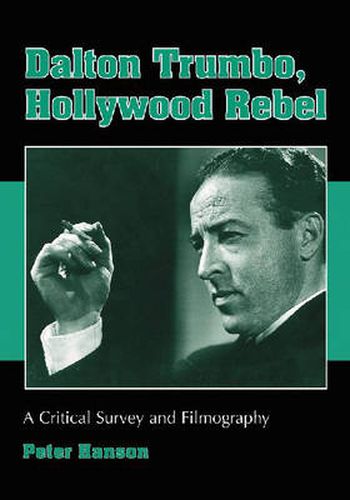Readings Newsletter
Become a Readings Member to make your shopping experience even easier.
Sign in or sign up for free!
You’re not far away from qualifying for FREE standard shipping within Australia
You’ve qualified for FREE standard shipping within Australia
The cart is loading…






This title is printed to order. This book may have been self-published. If so, we cannot guarantee the quality of the content. In the main most books will have gone through the editing process however some may not. We therefore suggest that you be aware of this before ordering this book. If in doubt check either the author or publisher’s details as we are unable to accept any returns unless they are faulty. Please contact us if you have any questions.
As a screenwriter, novelist, and political activist, Dalton Trumbo stands among the key American literary figures of the 20th century - he wrote the classic antiwar novel
Johnny Got His Gun , and his credits for
Spartacus
and
Exodus
broke the anticommunist blacklist that infected the movie industry for more than a decade. By defining connections between Trumbo’s most highly acclaimed films (including
Kitty Foyle ,
Thirty Seconds Over Tokyo , and
Roman Holiday ) and his important but lesser-known movies ( The Remarkable Andrew ,
He Ran All the Way , and
The Boss ), the author identifies how for nearly four decades Trumbo used the archetype of the rebel hero to inject social consciousness into mainstream films. This new critical survey - the first book-length work on Trumbo’s screenwriting career - examines the scores of films on which Trumbo worked and explores the techniques that made him, at the time he was blacklisted in 1947, Hollywood’s highest-paid writer. Hanson reveals how Trumbo dealt with major themes including rebellion, radical politics, and individualism - while also detailing lesser-known areas of Trumbo’s screenwriting, such as his troubling portrayal of women, the dichotomy between his proletarian attitude and bourgeois lifestyle, and the almost surreptitious manner in which he included antiestablishment rhetoric in seemingly innocuous scripts. An extensive filmography is included.
$9.00 standard shipping within Australia
FREE standard shipping within Australia for orders over $100.00
Express & International shipping calculated at checkout
This title is printed to order. This book may have been self-published. If so, we cannot guarantee the quality of the content. In the main most books will have gone through the editing process however some may not. We therefore suggest that you be aware of this before ordering this book. If in doubt check either the author or publisher’s details as we are unable to accept any returns unless they are faulty. Please contact us if you have any questions.
As a screenwriter, novelist, and political activist, Dalton Trumbo stands among the key American literary figures of the 20th century - he wrote the classic antiwar novel
Johnny Got His Gun , and his credits for
Spartacus
and
Exodus
broke the anticommunist blacklist that infected the movie industry for more than a decade. By defining connections between Trumbo’s most highly acclaimed films (including
Kitty Foyle ,
Thirty Seconds Over Tokyo , and
Roman Holiday ) and his important but lesser-known movies ( The Remarkable Andrew ,
He Ran All the Way , and
The Boss ), the author identifies how for nearly four decades Trumbo used the archetype of the rebel hero to inject social consciousness into mainstream films. This new critical survey - the first book-length work on Trumbo’s screenwriting career - examines the scores of films on which Trumbo worked and explores the techniques that made him, at the time he was blacklisted in 1947, Hollywood’s highest-paid writer. Hanson reveals how Trumbo dealt with major themes including rebellion, radical politics, and individualism - while also detailing lesser-known areas of Trumbo’s screenwriting, such as his troubling portrayal of women, the dichotomy between his proletarian attitude and bourgeois lifestyle, and the almost surreptitious manner in which he included antiestablishment rhetoric in seemingly innocuous scripts. An extensive filmography is included.